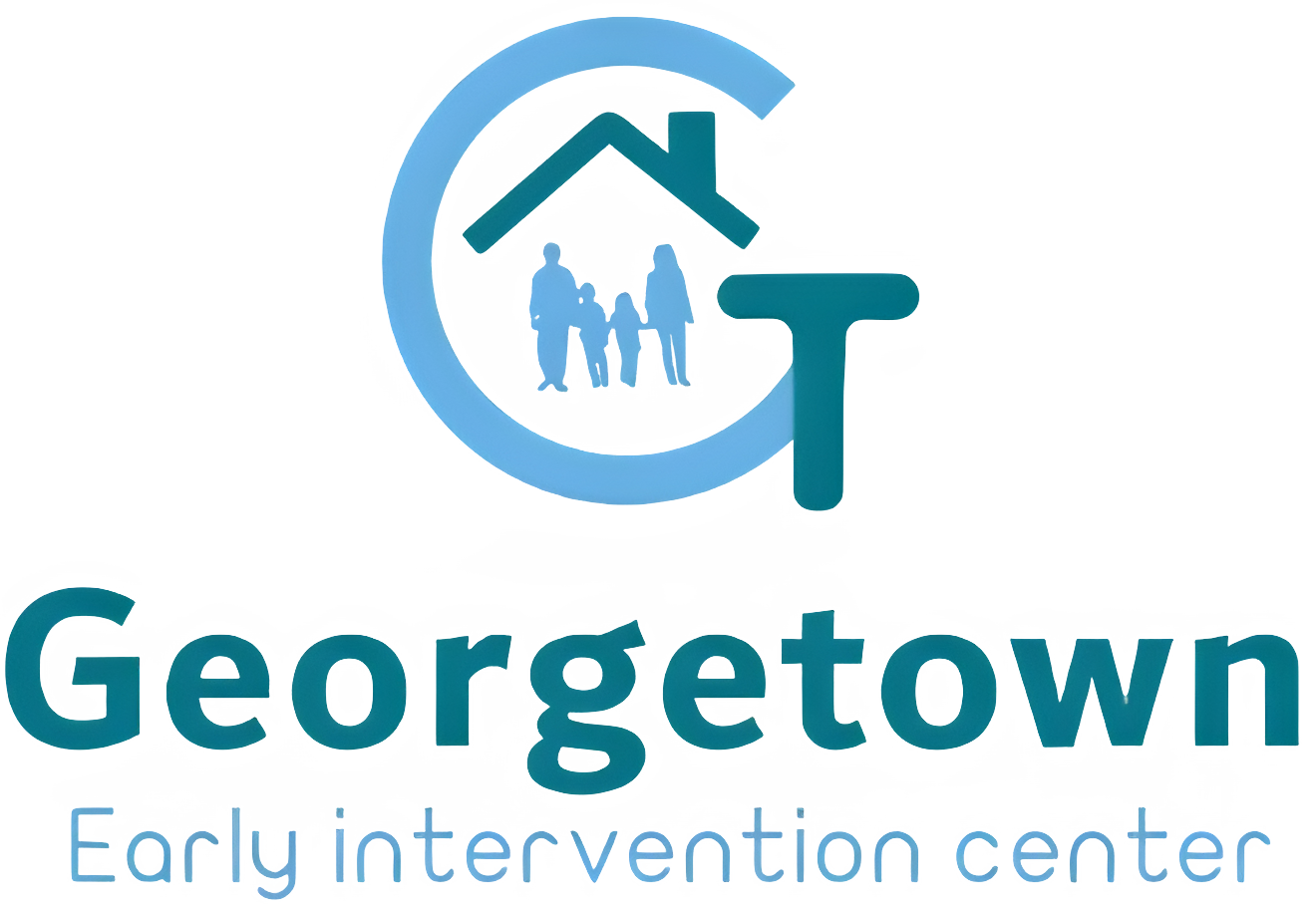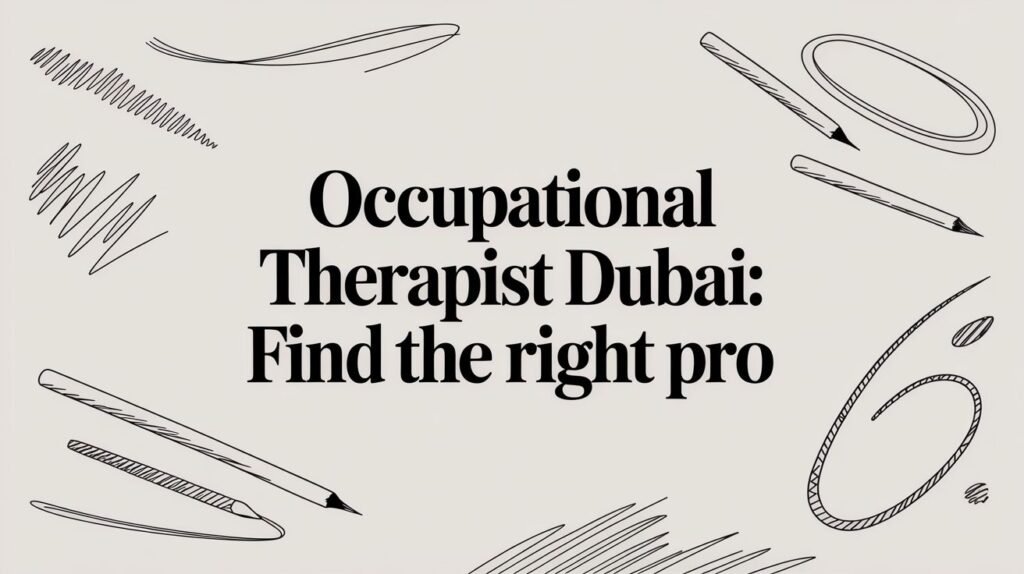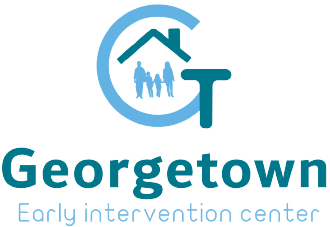When you need help getting back to the things that matter in your daily life, an occupational therapist in Dubai can be your most important guide. Think of them as a highly skilled coach who provides the strategies and tools you need to overcome physical, sensory, or cognitive hurdles and truly thrive.
What an Occupational Therapist Actually Does

It’s easy to get the wrong idea. Many people hear "occupational" and immediately think of jobs and careers. But in this field, an "occupation" is simply any meaningful activity that occupies your time.
For a child, their main occupations are playing, learning at school, and interacting with friends. For an adult, it could be anything from cooking a meal and managing household chores to returning to work after an injury. When something gets in the way of these fundamental activities, an occupational therapist (OT) is the professional who steps in to help.
A Practical, Hands-On Approach
Occupational therapy is all about doing. It's an action-based therapy focused on finding practical, real-world solutions to improve your ability to function independently.
An OT will look closely at how you perform a specific task, pinpoint exactly where the breakdown is happening, and then craft a personalized plan to help you bridge that gap. This often starts with a detailed assessment, sometimes including a comprehensive functional capacity evaluation to get a clear picture of your physical and cognitive strengths.
The core philosophy of occupational therapy is enabling participation. It’s about empowering individuals to do the things they want and need to do, adapting either the task, the environment, or the person's skills to achieve that goal.
Real-World Examples of OT in Action
So, what does this look like in practice? Here are a few scenarios where an occupational therapist in Dubai can make a profound impact:
- For a child with autism spectrum disorder (ASD): An OT might design sensory-friendly routines to help them cope with a busy classroom, making it easier to focus, learn, and socialize with classmates.
- For an adult recovering from a stroke: Therapy could focus on re-learning how to safely prepare a meal in their own kitchen or practicing techniques to get dressed independently using adaptive tools.
- For an older adult with arthritis: The OT could recommend simple home modifications, like installing grab bars in the shower, and teach joint protection strategies to make daily activities far less painful.
At the end of the day, occupational therapy is about closing the gap between a person’s current abilities and their desired life. To see the full scope of what's possible, you can find more information on our dedicated page about occupational therapy.
Why Demand for OTs Is Growing in Dubai
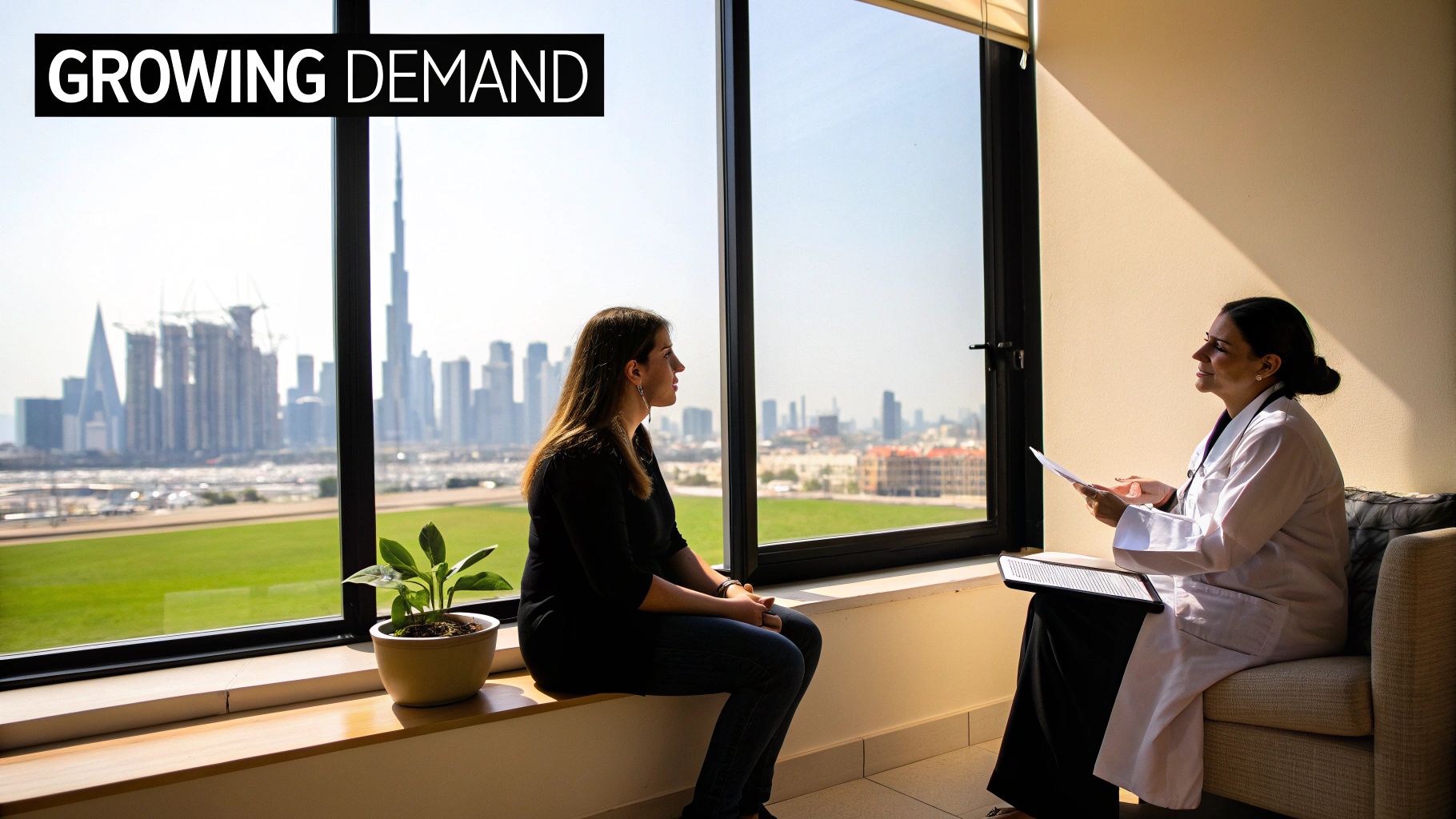
Dubai's fast-paced, forward-thinking culture is changing how we look at health. We're moving beyond just treating illness and starting to focus on what it truly means to live well and function effectively in our daily lives. This shift has opened the door for professions like occupational therapy to step into the spotlight.
Finding a qualified occupational therapist in Dubai isn't a niche request anymore; it's becoming a mainstream need for families and individuals across the city.
What's behind this growing demand? A couple of big things are at play. For one, parents and teachers are far more tuned in to children's developmental milestones. They're spotting potential challenges with sensory processing, fine motor skills, or social interactions earlier than ever and understand the value of getting proactive support.
At the same time, Dubai's modern workforce comes with its own pressures. We're seeing a greater need for practical rehabilitation after workplace injuries, strategies for managing work-related stress, and expert advice on ergonomics. This has really broadened the scope of what occupational therapy offers adults here.
A Growing and Respected Profession
As the need for this kind of specialized care has grown, occupational therapy has cemented its place as an essential part of the UAE's healthcare landscape. You can see this reflected in the career opportunities and professional respect for therapists in the region.
The numbers tell a clear story. The average annual salary for an Occupational Therapist in the UAE is around AED 108,000. Of course, this varies with experience. A therapist just starting out might earn about AED 51,000, while a seasoned professional can command AED 123,000 or more. Top-tier specialists can even reach salaries as high as AED 309,000.
These figures show a stable, expanding field that's attracting top talent to Dubai. You can dig into more detailed salary information for OTs in the UAE on PayScale.com/Salary). This professional growth means that when you seek help, you're tapping into a strong network of qualified experts committed to high standards of care.
Key Drivers of Increased Demand
This surge isn't happening by accident. It's a direct response to the real-world needs of Dubai's diverse community. The city's commitment to inclusive education and top-tier healthcare has created an environment where functional challenges are identified and properly addressed.
A few specific trends are really pushing this forward:
- Inclusive Education Policies: More and more schools in Dubai are welcoming students with diverse needs. This creates a direct need for OTs to provide support in the classroom, helping children thrive academically and socially.
- Focus on Early Intervention: There's a powerful city-wide emphasis on catching and addressing developmental delays as early as possible. This is the bread and butter of pediatric occupational therapy.
- Advanced Corporate Wellness: Businesses are getting serious about employee well-being. They're investing in ergonomic assessments and stress management programs, often led by occupational therapists, to keep their teams healthy and productive.
- Rehabilitation Services: As our population grows and ages, the demand for sophisticated rehab services—whether after an injury, surgery, or for age-related conditions—is on the rise.
The rise of occupational therapy in Dubai reflects a deeper understanding that true health isn't just the absence of illness, but the ability to fully and meaningfully participate in life.
This evolution in healthcare thinking is great news for everyone. It means that finding the right support to overcome personal barriers and reach your goals is more accessible than ever before.
Who Can Benefit from Occupational Therapy?
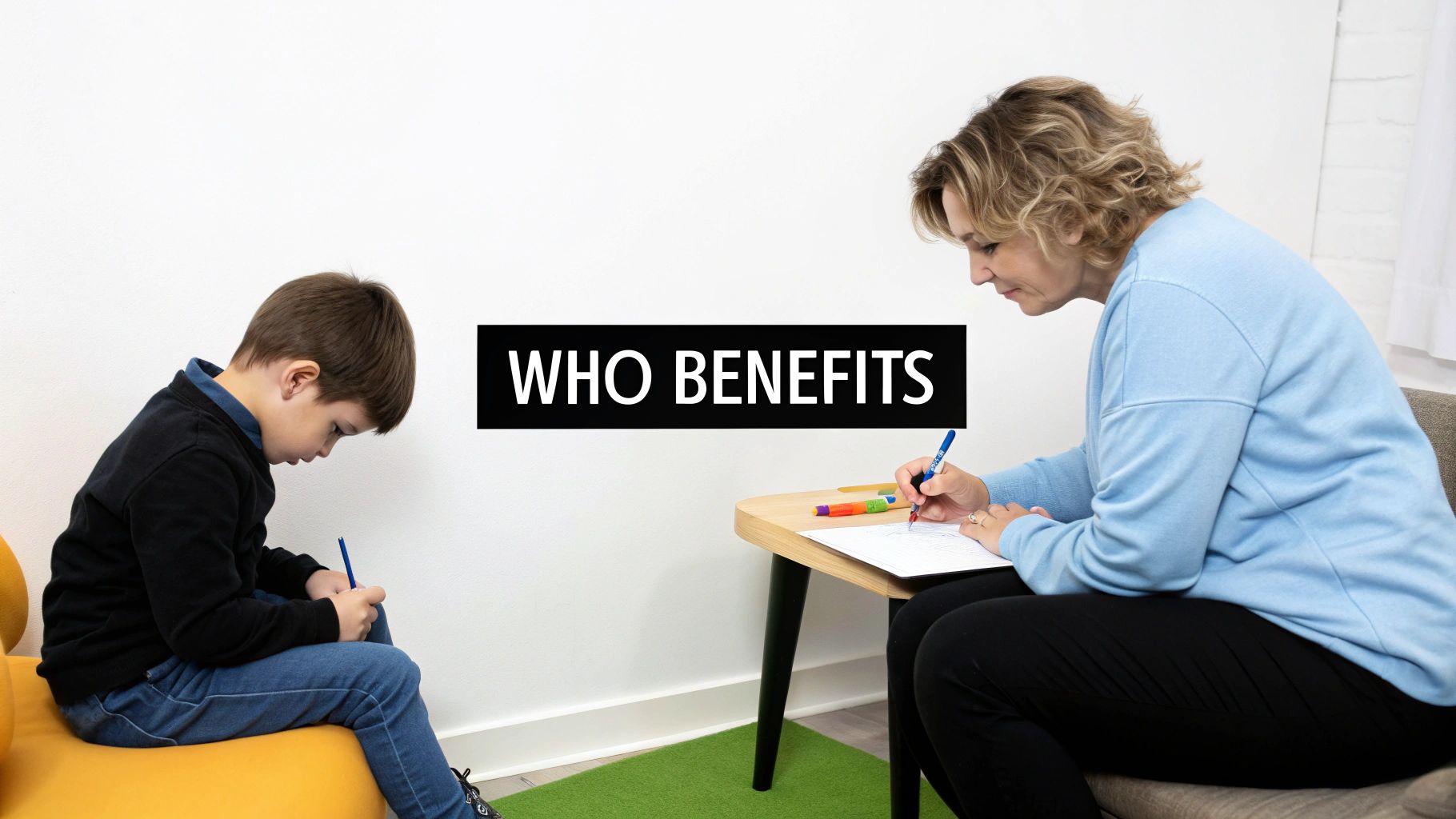
It’s a common misconception that occupational therapy is only for a specific type of person or condition. The reality is that OT offers practical, life-changing support for a surprisingly wide range of people, from toddlers to seniors. Its power lies in its flexibility—it can be adapted to almost any challenge that gets in the way of living a full life.
Think of an occupational therapist in Dubai as a problem-solver for daily living. They work with anyone who struggles to perform the meaningful activities—the "occupations"—that fill their day. This could be a child learning to socialise at school or an adult regaining independence after an injury.
The support generally falls into two broad areas: paediatrics (for children and adolescents) and adult rehabilitation. While the core principles are the same, the goals and strategies are carefully tailored to the unique challenges of each life stage.
Paediatric Occupational Therapy for Children
For children, effective therapy often looks a lot like play. A skilled OT creates fun, engaging activities that are secretly designed to build crucial developmental skills. They look at the whole child—how they interact at home, succeed at school, and connect with friends on the playground.
A child might see an occupational therapist in Dubai for challenges related to:
- Autism Spectrum Disorder (ASD): Therapists can help children with ASD navigate social cues, manage sensory overload in busy places like malls, and establish routines that bring comfort and predictability.
- Sensory Processing Disorder (SPD): For a child overwhelmed by noise or touch, an OT designs a "sensory diet." This isn't about food; it's a personalised plan of activities that helps regulate their nervous system, preventing meltdowns and improving focus.
- Developmental Delays: This could involve mastering fine motor skills for handwriting and buttoning a shirt, or building gross motor skills for running, jumping, and playing sports.
- ADHD: OTs provide practical strategies to improve organisation, manage time, and maintain focus, empowering children to thrive in the classroom and at home.
An occupational therapist's goal is to empower a child to become as independent as possible. They build skills not just for today, but for a lifetime of successful participation.
Adult Occupational Therapy and Rehabilitation
In the adult world, occupational therapy often centres on regaining skills lost to injury or illness or finding new ways to manage a chronic condition. The ultimate aim is to restore independence, purpose, and quality of life. This could mean returning to a beloved career or simply being able to cook a meal safely at home.
An adult may find occupational therapy incredibly helpful for:
- Stroke Rehabilitation: Relearning essential daily activities like dressing, cooking, and personal grooming is a common and critical focus after a stroke.
- Workplace Injuries: An OT can be the key to a safe return to work. They might modify job tasks, recommend ergonomic equipment, or help rebuild the specific physical skills needed for the role.
- Mental Health Challenges: For conditions like anxiety and depression, OTs help establish healthy routines, develop coping mechanisms, and re-engage in hobbies and activities that provide a sense of purpose.
- Age-Related Conditions: This often involves making home modifications for safety and accessibility due to arthritis or reduced mobility, helping older adults maintain their independence for as long as possible.
To give you a clearer picture, this table outlines some common conditions and the practical ways an occupational therapist can help.
Common Conditions Treated by Occupational Therapists in Dubai
| Focus Area | Common Conditions & Challenges | Example OT Intervention |
|---|---|---|
| Paediatrics | Autism Spectrum Disorder (ASD): Difficulty with social interaction, sensory sensitivities. | Creating social stories to prepare for new situations; designing sensory-friendly play activities. |
| ADHD: Challenges with focus, organisation, and emotional regulation. | Introducing visual schedules and time-management tools; using games to build attention skills. | |
| Developmental Delays: Lagging fine motor skills (e.g., handwriting) or gross motor skills (e.g., balance). | Using therapeutic putty and craft activities to strengthen hand muscles; setting up obstacle courses. | |
| Adults | Stroke Recovery: Loss of motor function, cognitive challenges, difficulty with daily tasks. | Practicing one-handed dressing techniques; recommending adaptive kitchen utensils. |
| Physical Injury/Surgery: Limited mobility, pain management after a workplace injury or operation. | Teaching energy conservation techniques; recommending ergonomic workstation setups for return to work. | |
| Mental Health (Anxiety/Depression): Lack of motivation, social withdrawal, difficulty with routine. | Helping establish a structured daily schedule; re-introducing meaningful hobbies to build confidence. |
As you can see, the scope is vast, but the mission is always the same: to help people participate in the activities that matter most to them.
How to Choose the Right Occupational Therapist in Dubai

Starting the therapy journey is a big step, and finding the right professional is arguably the most important part. The connection you or your child build with a therapist can make all the difference, directly impacting progress and success. In a city like Dubai, with its expanding healthcare landscape, knowing what to look for is key to getting effective, high-quality care.
This isn't just about ticking boxes on a qualification checklist. It's about finding a genuine partner who understands your specific goals and challenges. A great occupational therapist in Dubai brings more than just technical skills to the table; they build a supportive, encouraging relationship. This is especially true when working with children, where that strong, trusting bond is the very foundation of successful therapy.
Verify Credentials and Specializations
First things first: always confirm the therapist is licensed by the Dubai Health Authority (DHA). Think of this as the essential starting point. It's a non-negotiable benchmark guaranteeing they’ve met the strict professional and educational standards required to practice here. Reputable clinics will have this information readily available.
Once that's confirmed, you can dig a little deeper into the therapist's specific areas of expertise. Occupational therapy is a massive field, and most OTs focus on certain populations or conditions.
Common specializations you might see include:
- Paediatrics: Focused on helping children with everything from developmental milestones and sensory integration to skills needed for school.
- Sensory Integration (SI): A highly specialized approach for anyone who struggles to process sensory information from their environment.
- Physical Rehabilitation: Aimed at adults recovering from major life events like injuries, strokes, or surgeries.
- Mental Health: Using everyday activities and routines to support individuals dealing with conditions like anxiety or depression.
Make sure their specialty is a direct match for your needs. For instance, if your child has sensory processing challenges, a therapist with an SI certification is an absolute game-changer.
Research and Initial Consultation
Like most people, you'll probably start your search online. It can be telling to see how a clinic presents itself—for example, optimizing a Google Business Profile well often means they're serious about being accessible to potential clients. After you've created a shortlist, the initial consultation is your chance to really see if it's a good fit. This isn't just a formality; it's an interview.
Think of the first meeting as a two-way conversation. You are assessing their approach, and they are beginning to understand your needs. A good therapist will welcome your questions and provide clear, thoughtful answers.
Come prepared with a list of questions to keep the conversation on track and ensure all your concerns are addressed. For more tips on finding local services, our guide on searching for occupational therapy near me has some great local insights.
Key Questions to Ask a Potential Therapist
During your chat, try to get a clear picture of their methods, experience, and how they communicate. Here are a few essential questions to get you started:
- What is your experience with [your specific condition or challenge]? Don't be afraid to ask for examples of how they've helped others with similar needs.
- What therapeutic approaches do you use? Do they lean towards a specific model, like sensory integration or a more activity-based approach?
- How do you set goals and measure progress? You're looking for a collaborative process where your input is valued and progress is tracked with clear, understandable metrics.
- What does a typical therapy session look like? This helps you imagine the process and see if their style clicks with what you're looking for.
- How do you involve parents or family members in the therapy process? For therapy to truly stick, skills often need to be reinforced at home, making family involvement crucial.
At the end of the day, trust your gut. The right occupational therapist in Dubai won't just be qualified and experienced—they'll also make you feel heard, respected, and genuinely hopeful about the path ahead.
Ensuring High Standards of Care in the UAE
Choosing a healthcare provider is a huge decision, and you need to feel confident in their qualifications. When you look for an occupational therapist in Dubai, you're tapping into a profession held to incredibly high standards, which means you or your loved one will receive exceptional, evidence-based care.
The UAE’s commitment to top-tier healthcare shines through in the rigorous training and continuous professional development required of every therapist.
Rigorous Training and Professional Development
The journey to becoming a great therapist starts with a solid education. Local universities are stepping up to meet the city's growing needs by establishing comprehensive OT programs. This pipeline ensures a steady stream of well-trained professionals ready to make a difference.
For example, Liwa University offers a Bachelor of Science in Occupational Therapy. This isn't a walk in the park; it's a demanding 4-year program requiring 138 credit hours of intensive study.
But the learning doesn't stop at graduation. The healthcare community in Dubai is all about ongoing education. Big events like the International Conference on Physical and Occupational Therapy give practitioners a chance to share insights and stay up-to-date with global best practices. This commitment to lifelong learning is what keeps standards so high. You can learn more about these professional development opportunities and the latest insights on allconferencealert.com.
The combination of stringent academic training and a culture of continuous learning means that therapists in Dubai are not just qualified—they are current, skilled, and deeply invested in their professional growth.
A Well-Regulated Healthcare System
Backing up this strong educational framework is a tightly regulated healthcare system. Every single practicing occupational therapist in Dubai must be licensed by the Dubai Health Authority (DHA). This isn't just a piece of paper; it’s a process that meticulously verifies their credentials, experience, and ethical standing.
This oversight provides an essential layer of assurance for patients and their families, ensuring accountability across the board. When you work with a DHA-licensed therapist, you know for certain they have met the strict benchmarks for safe and effective practice.
Understanding the depth of these evaluations is key for anyone considering therapy. You can get a better sense of what's involved by reading our guide to comprehensive assessment services in Dubai.
Ultimately, these systems work together to create a network of highly skilled professionals you can truly trust. This focus on quality and regulation gives you peace of mind, knowing you're partnering with an expert dedicated to achieving the best possible outcomes for you.
Common Questions About Occupational Therapy in Dubai
It’s completely normal to have a lot of questions when you’re looking into therapy. Whether it’s for you or someone you care about, getting clear, direct answers is the first step toward making a confident choice. Let's tackle some of the most frequent questions people have about finding an occupational therapist in Dubai.
We'll clear up the confusion between different types of therapy, talk about what you can expect in terms of cost and insurance here in the UAE, and give you a realistic idea of how long the process might take.
What Is the Difference Between an Occupational Therapist and a Physical Therapist?
This is a really common question, and it's easy to see why people get them confused! While both OTs and physical therapists (PTs) are crucial for helping people recover and live better, they come at it from different angles.
Think of it like this: a physical therapist is like a master mechanic for your body, and an occupational therapist is like a life coach who helps you put that body to good use in your daily routine.
A physical therapist focuses on restoring movement, building strength, and improving your range of motion. If you had knee surgery, for example, a PT would work with you to get you walking again without pain. Their main job is to fix the physical machine.
An occupational therapist in Dubai picks up where the PT leaves off. They help you take that improved physical ability and apply it to the actual, meaningful activities—or "occupations"—that make up your life.
Here's a simple way to think about it: A physical therapist helps you learn to walk again. An occupational therapist helps you walk to the kitchen, make yourself a sandwich, and sit down to enjoy it.
Their focus is intensely practical. It could be anything from an adult re-learning how to type an email after an injury to a child mastering the fine motor skills needed to button their own shirt.
How Much Does Occupational Therapy Cost in Dubai?
Let's talk about the financial side of things, as it's a key part of the planning process. The cost of a session with an occupational therapist in Dubai can vary quite a bit, depending on things like the clinic's reputation, the therapist's specific expertise, and how long each session is.
As a general guide, you can expect a single session to be somewhere in the range of AED 350 to AED 700. Because therapy is often a journey, not a one-off appointment, many clinics offer packages for booking a block of sessions. This can often bring the per-session cost down and make ongoing support more manageable.
You’ll definitely want to have a conversation with your insurance provider. More and more insurance plans in the UAE are starting to cover occupational therapy, especially for children with diagnosed conditions like autism or ADHD. Before you commit, always ask the clinic to provide a clear, transparent breakdown of their fees so there are no surprises.
How Long Does Occupational Therapy Usually Take?
This is the classic "how long is a piece of string?" question. There’s no one-size-fits-all answer because every single person's situation is different. The length of therapy is completely tied to an individual's goals and the nature of the challenges they're working on.
For some people, it might be a relatively short-term thing. An adult recovering from a simple hand injury might only need a couple of months of focused therapy to get back to their work and hobbies.
For others, therapy is more of a long-term partnership. A child with a significant developmental delay, for instance, could benefit from occupational therapy for years. The support simply evolves with them as they grow, helping them navigate new challenges at each stage of life.
The process always starts with a detailed assessment. From there, your therapist will work with you to create a personalized plan with clear, achievable goals and an estimated timeline. They'll constantly review your progress and tweak the plan as you go, making sure the therapy is always working for you.
